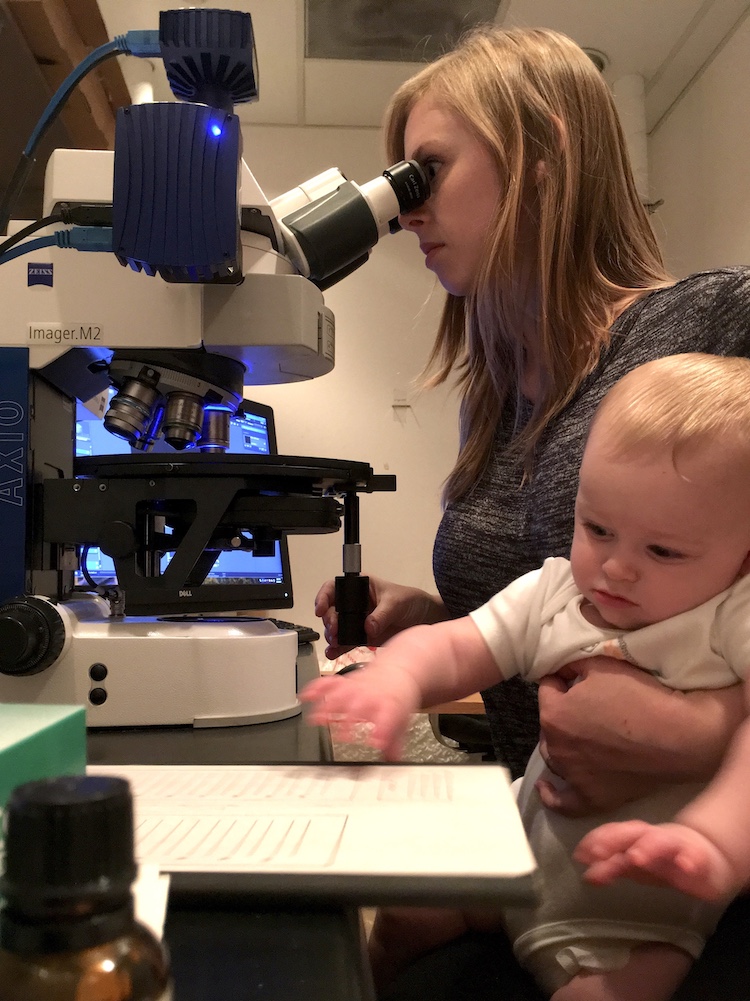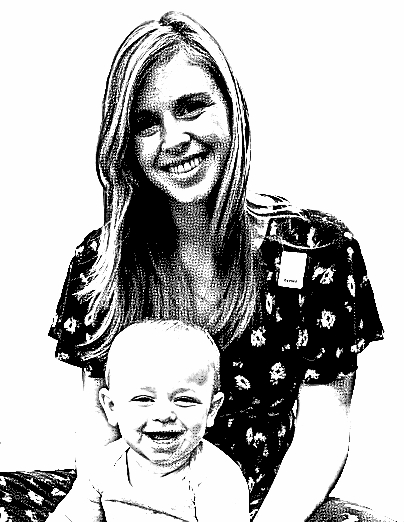Viewpoint articles are a vehicle for members of the Caltech community to express their opinions on issues surrounding the interface of science and society. The views expressed here do not necessarily reflect the views of Caltech or the editorial board of Caltech Letters. Please see our disclaimer.
Graduate school is challenging, almost by definition. To many, the thought of getting a PhD conjures up images of endless work days that turn into late, sleepless nights in lab as experiments fail to go as planned. Or of several years living in a tiny apartment, pinching pennies in order to pursue an elusive dream.
Parenthood is also challenging. It similarly entails long and sleepless nights and significant financial burden, though this time due to the stresses of keeping little ones alive and well-cared for.
Both undertakings are life experiences of the more difficult, yet more rewarding variety. Most people who wish to do both of these things make a choice: grad school now, parenthood later.
But what about students who do both? Those who begin graduate school despite having a family, or have a child despite being in graduate school. I am a graduate student-parent. We do exist. However, as I and others in my position have discovered, the system is set up as if we do not.
I am working towards a PhD in developmental biology. I study the molecular controls that drive a single cell to multiply and organize into the many complex systems that create life. Many have joked that having a baby was one of my thesis experiments. If so, this was a very poorly planned experiment.

The author and her baby, busy at the microscope
Riley Galton
When doing an experiment, I like to have everything in place before I start. I work with chicken embryos, so prior to dissecting any eggs I make sure I have any necessary instruments, all the chemicals to process them, and time reserved on the microscope to examine them once they reach the right developmental stage.
Had my baby been one of my thesis experiments, I would have similarly ensured that I had the necessities figured out before he arrived. These include a decent place for him to live, sufficient time to bond with him, someone to take care of him when I went back to work, and enough money to cover all of these expenses. Unfortunately, when you’re a graduate student-parent, especially at Caltech, additional challenges compound an already enormous task.
Like many top universities, Caltech is located in an affluent neighborhood of a densely populated city. Coupled with our meager graduate student stipend, this makes finding a decent place to live difficult. For reference, a two bedroom apartment near Caltech runs at about 80% of a grad student’s stipend, while a one bedroom costs roughly 65%. Though affordable housing issues resonate with most grad students, student-parents feel the burden to a higher degree, as money-saving options like living with roommates or in a studio apartment are out of the question with kids.
Caltech has the means to solve this problem, though they currently only set aside a few units for families, which doesn’t come close to meeting the need. Most of Caltech’s off-campus student housing is rented out via a waitlist for well under market value. Unfortunately, student-parents have no priority on this waitlist and most of the units go to students who have been on it for years. This leads to situations where senior grad students pay far less to live alone in a two bedroom Caltech apartment than a family must to live in a one bedroom elsewhere.
In addition to housing, graduate student-parents struggle to find affordable childcare. Like the housing market, the cost of childcare in affluent and crowded areas is extremely high, with infant rates near Caltech starting at about 70% of a grad student’s income. Additionally, the demand often far exceeds the supply, and thus most facilities—including Caltech’s own daycare—have monumental waitlists.
During my pregnancy I stopped by the Children’s Center at Caltech to get more information, having been on the waitlist for six months. They told me it would probably be several years before my baby got a spot, but it was difficult to predict since they never knew how many children of faculty, who had priority, would be incoming. They gave me some flyers about nanny agencies and other, more expensive daycares. When I mentioned that I was a grad student and didn’t think these were realistic options, they told me that many in my situation found it easier to have one parent stay home with the baby than to pay a nanny, who would typically make more than a graduate student. Though I can appreciate that this might be a less expensive solution, few of us are in grad school because it pays well. Giving up our career aspirations to save money is not what we would consider a feasible option.
For graduate student-parents who wish to continue their careers, this leaves us with few alternatives. Two of my colleagues were forced to fly in a grandparent to care for their baby so that they could return to work until a more permanent solution could be found. I have very supportive advisors and have been able to bring my baby to lab with me while I search for a unicorn nanny—willing to care for my baby and a friend’s for a price we can both afford. We have not found them yet. When I have to do experiments that require more than 25% of my attention, I either hire a babysitter for more than I get paid per hour, or work at night, after my husband gets home from his less flexible job.
Even before the childcare problem starts, the issue of parental leave—which is often minimal for graduate students—arises. Though maternity leave policies vary depending on the institution, at first they appear to be on par with the rest of the workforce—pregnant graduate students get 6–12 weeks (8 at Caltech) of paid leave. There’s a catch though: students are ineligible for the state-run disability and parental leave programs that significantly extend maternity leave for much of the California workforce. At Caltech, this is exacerbated by the fact that there is currently no paid leave available for graduate student-fathers.
In all of the aforementioned categories, Caltech falls far behind many of its contemporaries. Harvard, Stanford, Duke and Princeton all offer paid time off for both parents after the birth of a child, as well as significant additional funding to offset child-rearing costs1–7. Harvard and Princeton also offer discounted childcare options on top of subsidized back-up childcare3,5, while families have priority for student housing at Stanford and Harvard8,9.
Underlying these policy issues are smaller oversights that reinforce the unsupportive atmosphere graduate student-parents face at Caltech. These include a lack of changing tables anywhere on campus—including places frequented by families, such as the Red Door cafe—and no elevators in the parking garages, such that I carry a stroller up and down several flights of stairs every day. Most important is the distinct shortage of “lactation rooms,” or private places mothers can pump breast milk while at work. Though Caltech offers a few of these, the nearest one to me is in a completely different building and only available until 5pm, which isn’t very helpful if I’m working after hours.
When I voice my frustrations, I’m occasionally met with an unsympathetic response akin to “Well, it was your choice to go down this road.” This implies that I shouldn’t have had a baby at this point in my career, knowing that there would be almost no support for graduate student-parents. But what are my options as a female scientist who wants to remain in academia, but also wants to have a family?
I could wait until my postdoctoral position, that time in between grad school and starting my career as a professor. In my field, this puts me in my early thirties, a pretty normal time to have a kid. But it also means that my career clock is ticking fast, as the length of my postdoc is directly correlated with my competitiveness for a tenure-track position.
Alternatively, I could hold off until I have a tenure-track position. I’m probably in my mid- to late-thirties by now, at which point most women experience a sharp decline in fertility. If I’m fortunate enough to have a baby, I am now juggling maternity leave and adjusting to the new normal of living with an infant, all while trying to figure out how to run a lab and be productive enough to get tenure. And if I wanted more than one child? Well, you can do the math.
Working towards a PhD is challenging, and adding a baby to the mix only makes it more so. In terms of my academic timeline, however, I have perhaps the most leeway at this point in my career.
Realistically, there is no good time to have a kid in the trajectory of an academic scientist. While benefits may increase with rank, so too do the career demands, and if you’re a woman, opportunity is continuously declining. If we admit there is no qualitative difference between a graduate student or faculty member who chooses to be a parent, the problems I face are not a result of improper timing, but part of a larger culture that fails to accommodate scientists—particularly women in science—who also want to be parents.
There is no doubt that academia’s indifference towards family-friendly policies directly contributes to the fact that there are far fewer women in independent research positions than men. It is well documented that women bear the brunt of the child-rearing burden, regardless of whether both parents work or not, and female scientists are almost twice as likely as their male counterparts to leave full-time careers in STEM after becoming parents10–12.
Having a baby in graduate school was my calculated attempt to overcome the status quo and work towards having both the family and career that I want. That said, I have encountered far more setbacks as a graduate student-parent than I could have imagined, and I am far from alone. I have joined others in my position in the newly-formed Caltech Student-Parent Advocacy Committee, to ask Caltech to make common-sense policy changes to better meet the basic needs of its graduate student-parents.
We are asking Caltech to immediately address what we have identified as the most pressing issues to students with families: housing, childcare, parental leave, and financial assistance. Many of the struggles we face could be attenuated if Caltech gave students with families priority for student housing, expanded its daycare to make space for students or subsidized other childcare options, improved its parental leave policies, and offered financial assistance to help with the additional costs of raising children.
If academic institutions want to cultivate the very best researchers from all walks of life, they must support all of their students regardless of if or when they choose to have a family. Scientists need more than laboratories; Caltech has the chance to provide for every member of its community, so that we may in turn work towards expanding the boundaries of human knowledge.
Cover image: Peter Kovalev/TASS via Nature
References
1: Childbirth and Adoption Accommodation. Princeton University.
2: Duke University Graduate School Childbirth and Adoption Accommodation Policy for Ph.D. Students. Duke Graduate School.
3: Expanded Family-Focused Benefits for Graduate Students. Princeton University.
4: Initiatives for Graduate Student Families at Stanford and next Steps. Notes from the Quad. 12 Dec 2018.
5: Parental Accommodation and Financial Support. Harvard University - The Graduate School of Arts and Sciences.
6: Pregnancy, Childbirth, Adoption and Lactation: Policy. Stanford Graduate Academic Policies and Procedures. 20 Dec. 2018.
7: Students With Children. Duke Graduate School
8: Applicants with Children. Harvard University Housing
9: Students with Children. Stanford Student Housing
10: Schoppe-Sullivan, Sarah. Dads are more involved in parenting, yes, but moms still put in more work.. 2 Feb 2013.
11: Cech, Erin A, and Mary Blair-Loy. The Changing Career Trajectories of New Parents in STEM . Proceedings of the National Academy of Sciences. 2019.
12: Else, Holly. Nearly half of US female scientists leave full-time science after first child. Nature. 19 Feb 2019.




